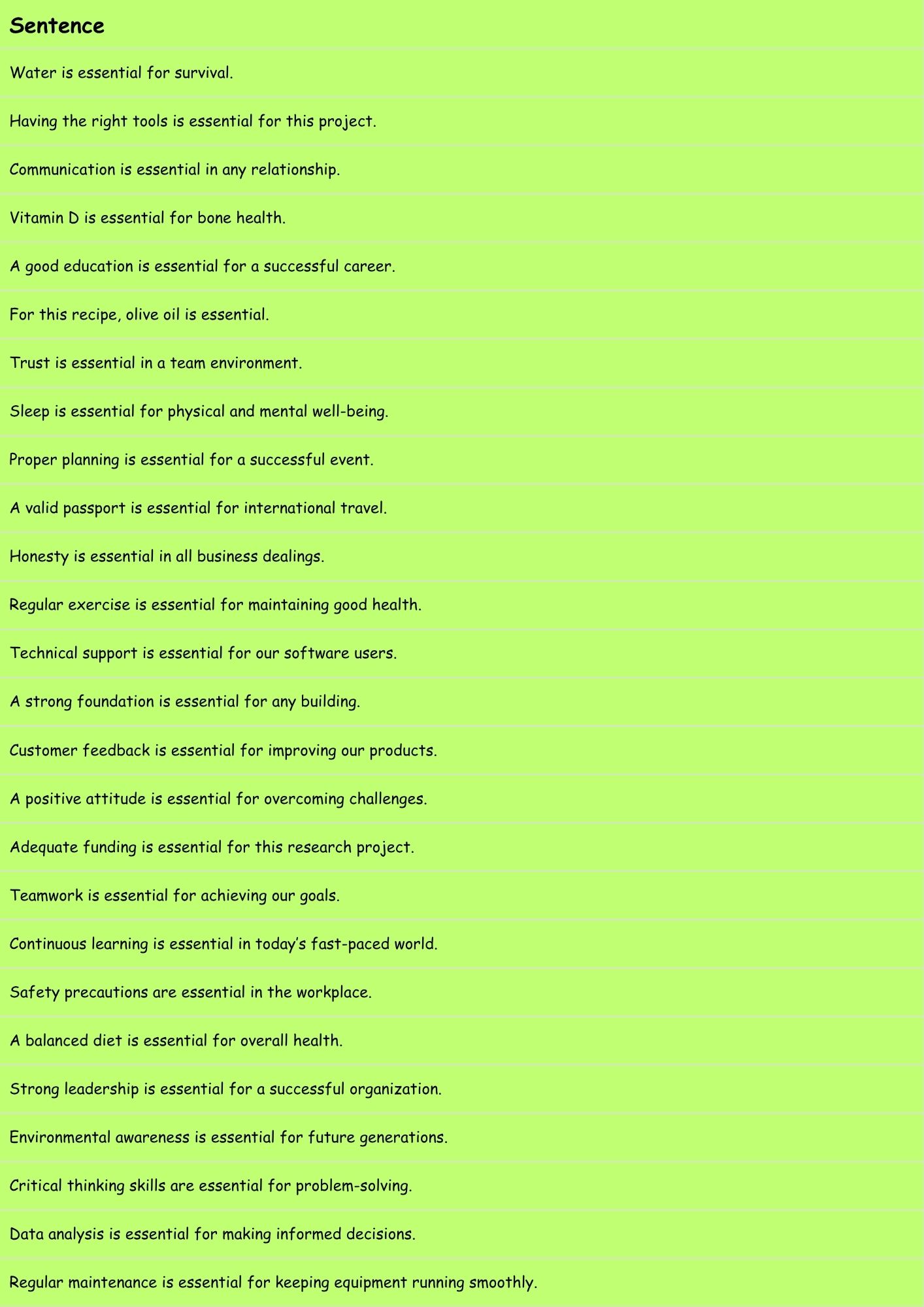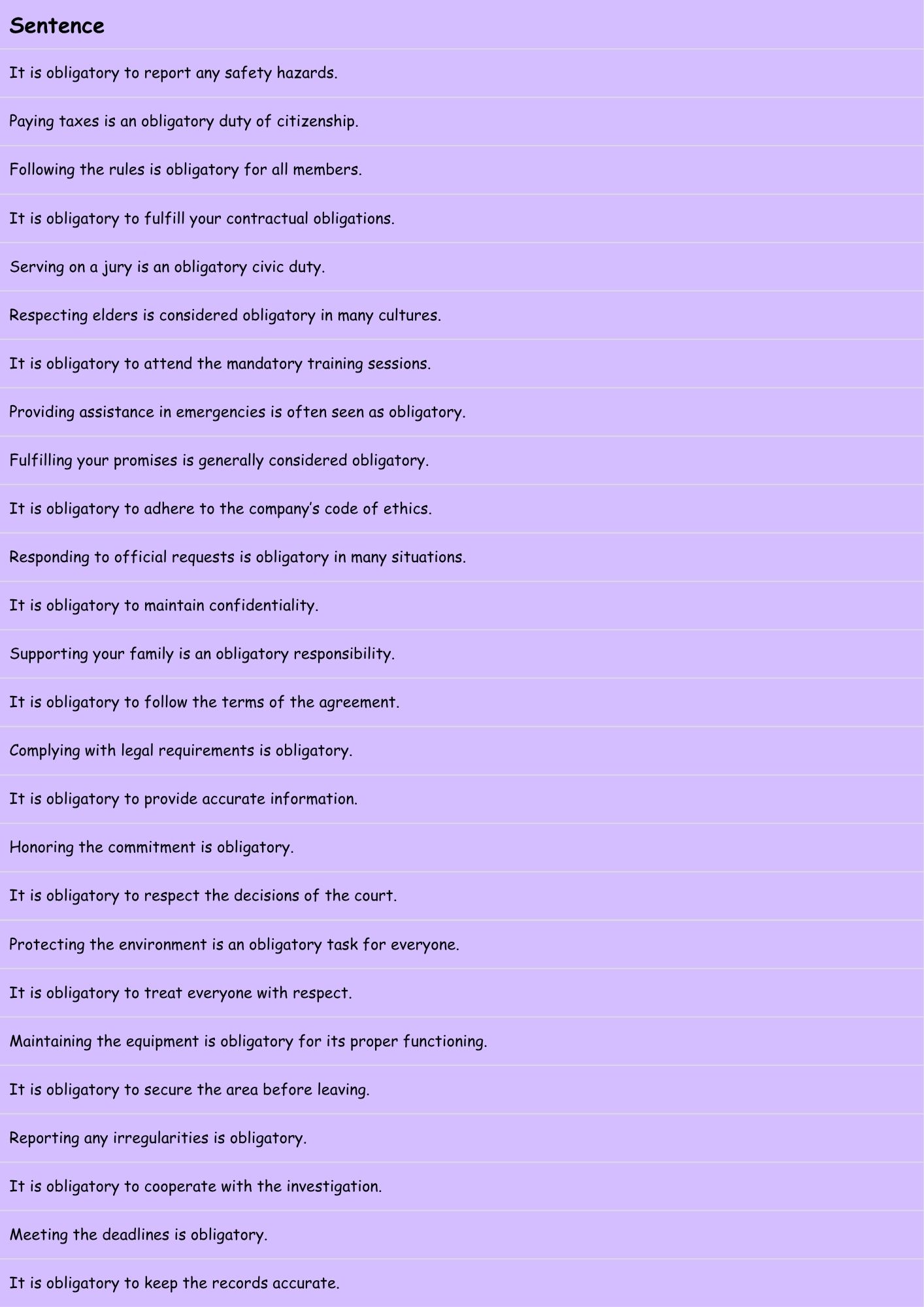Understanding adjectives of requirement is crucial for expressing necessity and obligation in English. These adjectives help us articulate what is needed, essential, or mandatory in various contexts, from everyday conversations to formal writing. This article provides a comprehensive guide to adjectives of requirement, covering their definition, structure, types, usage rules, common mistakes, and advanced applications. Whether you’re an ESL learner, a student preparing for exams, or simply someone looking to refine your English skills, this guide will equip you with the knowledge and practice you need to confidently use adjectives of requirement.
By mastering this aspect of grammar, you’ll be able to communicate more precisely and effectively, ensuring that your messages are clear and easily understood. Let’s dive in and explore the world of adjectives of requirement!
Table of Contents
- Definition of Adjectives of Requirement
- Structural Breakdown
- Types and Categories
- Examples
- Usage Rules
- Common Mistakes
- Practice Exercises
- Advanced Topics
- FAQ
- Conclusion
Definition of Adjectives of Requirement
Adjectives of requirement are words that describe something as being necessary, essential, or mandatory. They modify nouns to indicate that the noun is needed or required in a particular context. These adjectives often express a sense of obligation, duty, or necessity.
These adjectives play a significant role in formal and informal communication, ensuring that the degree of necessity is clearly conveyed. They are frequently used in instructions, rules, regulations, and general statements where the importance of something needs to be emphasized. Understanding and using these adjectives correctly is essential for clear and effective communication.
Structural Breakdown
Adjectives of requirement typically precede the noun they modify. The basic structure is: Adjective of Requirement + Noun. They can also be used after linking verbs like “is,” “are,” “was,” “were,” etc., to describe the noun. In this case, the structure is: Noun + Linking Verb + Adjective of Requirement.
For example:
- Essential documents (Adjective + Noun)
- This task is mandatory. (Noun + Linking Verb + Adjective)
Adjectives of requirement do not usually change form to agree with the noun they modify. They remain the same regardless of whether the noun is singular or plural.
Types and Categories
There are several adjectives that fall under the category of “adjectives of requirement.” Each adjective carries a slightly different nuance, indicating varying degrees of necessity and obligation. Here are some of the most common types:
Essential Adjectives
Essential means absolutely necessary or indispensable. It denotes something that is crucial and cannot be done without.
Necessary Adjectives
Necessary means required to achieve a certain goal or fulfill a certain condition. It implies that something is needed but might not be as critical as something “essential.”
Mandatory Adjectives
Mandatory means required by law or rules; obligatory. It suggests a formal requirement that must be followed.
Required Adjectives
Required means officially compulsory or demanded. It is similar to “mandatory” but can also apply to less formal situations.
Obligatory Adjectives
Obligatory means legally or morally bound to do something. It often implies a sense of duty or commitment.
Compulsory Adjectives
Compulsory means required by law or a rule; obligatory. This term is often used in the context of education or military service.
Imperative Adjectives
Imperative means of vital importance; crucial. It conveys a sense of urgency and necessity.
Vital Adjectives
Vital means absolutely necessary or important; essential. It is often used in contexts related to health, safety, or survival.
Examples
The following tables provide numerous examples of adjectives of requirement used in various contexts. Each table focuses on a specific adjective and illustrates its usage with multiple sentences.
Table 1: Examples Using “Essential”
This table showcases the usage of the adjective “essential” in different sentences, highlighting its meaning of being absolutely necessary.
| Sentence |
|---|
| Water is essential for survival. |
| Having the right tools is essential for this project. |
| Communication is essential in any relationship. |
| Vitamin D is essential for bone health. |
| A good education is essential for a successful career. |
| For this recipe, olive oil is essential. |
| Trust is essential in a team environment. |
| Sleep is essential for physical and mental well-being. |
| Proper planning is essential for a successful event. |
| A valid passport is essential for international travel. |
| Honesty is essential in all business dealings. |
| Regular exercise is essential for maintaining good health. |
| Technical support is essential for our software users. |
| A strong foundation is essential for any building. |
| Customer feedback is essential for improving our products. |
| A positive attitude is essential for overcoming challenges. |
| Adequate funding is essential for this research project. |
| Teamwork is essential for achieving our goals. |
| Continuous learning is essential in today’s fast-paced world. |
| Safety precautions are essential in the workplace. |
| A balanced diet is essential for overall health. |
| Strong leadership is essential for a successful organization. |
| Environmental awareness is essential for future generations. |
| Critical thinking skills are essential for problem-solving. |
| Data analysis is essential for making informed decisions. |
| Regular maintenance is essential for keeping equipment running smoothly. |

Table 2: Examples Using “Necessary”
This table provides examples of sentences using the adjective “necessary,” which means required to achieve a certain goal.
| Sentence |
|---|
| Some changes are necessary to improve the system. |
| It is necessary to have a valid driver’s license to operate a vehicle. |
| Taking breaks is necessary to avoid burnout. |
| It is necessary to complete the application form accurately. |
| Attending the meeting is necessary for all team members. |
| For this experiment, specific equipment is necessary. |
| It’s necessary to save money for future expenses. |
| Regular check-ups are necessary for maintaining good health. |
| It is necessary to update your software regularly. |
| Proper ventilation is necessary to prevent mold growth. |
| A strong password is necessary to protect your online accounts. |
| It is necessary to follow the instructions carefully. |
| Additional training may be necessary for this role. |
| It is necessary to conduct a thorough investigation. |
| Further research is necessary to understand the phenomenon. |
| It is necessary to obtain permission before proceeding. |
| Careful planning is necessary for a successful project. |
| It is necessary to address the issue promptly. |
| Continuous monitoring is necessary for quality control. |
| It is necessary to comply with all regulations. |
| A backup plan is necessary in case of emergencies. |
| It is necessary to document all procedures. |
| Effective communication is necessary for a successful collaboration. |
| It is necessary to provide clear instructions. |
| Sufficient funding is necessary to complete the project. |
| It is necessary to review the contract carefully. |
Table 3: Examples Using “Mandatory”
This table demonstrates the use of “mandatory” in sentences, emphasizing its meaning of being required by law or rules.
| Sentence |
|---|
| Attendance is mandatory for all students. |
| Wearing a seatbelt is mandatory while driving. |
| The safety briefing is mandatory for all new employees. |
| Filing taxes is mandatory for all citizens. |
| Compliance with the regulations is mandatory. |
| Vaccinations are mandatory for school enrollment. |
| Reporting accidents is mandatory in this workplace. |
| Completing the training program is mandatory. |
| Following the safety protocols is mandatory. |
| Submitting the report on time is mandatory. |
| Registering your vehicle is mandatory by law. |
| Participating in the survey is mandatory. |
| Attending the orientation session is mandatory. |
| Wearing protective gear is mandatory in the lab. |
| Adhering to the code of conduct is mandatory. |
| Renewing your license is mandatory every year. |
| Completing the health check is mandatory for travel. |
| Attending the annual meeting is mandatory for shareholders. |
| Reporting any suspicious activity is mandatory. |
| Complying with environmental regulations is mandatory. |
| Taking the final exam is mandatory to pass the course. |
| Signing the consent form is mandatory before treatment. |
| Following the dress code is mandatory for all staff. |
| Submitting the required documents is mandatory for approval. |
| Attending the emergency drill is mandatory for all residents. |
| Reporting income accurately is mandatory for tax purposes. |
Table 4: Examples Using “Required”
This table illustrates the usage of “required” in various sentences, indicating something that is officially compulsory or demanded.
| Sentence |
|---|
| A password is required to access the system. |
| Prior experience is required for this position. |
| References are required with your application. |
| A permit is required for construction work. |
| Specific skills are required for the job. |
| Payment is required at the time of service. |
| Registration is required to attend the event. |
| Documentation is required for verification. |
| Approval is required before proceeding with the project. |
| Training is required for all new employees. |
| Submissions are required by Friday. |
| Consent is required for medical procedures. |
| Information is required to process your request. |
| Verification is required before granting access. |
| A valid ID is required for entry. |
| A deposit is required to secure your booking. |
| Adherence to guidelines is required for participation. |
| A signature is required on the contract. |
| Additional details are required for processing. |
| A background check is required for certain positions. |
| Proper attire is required for the formal event. |
| A reservation is required at the restaurant. |
| A completed form is required for registration. |
| A detailed plan is required for the project proposal. |
| A security clearance is required for access to the facility. |
| A doctor’s note is required for medical leave. |
Table 5: Examples Using “Obligatory”
This table presents examples of sentences using the adjective “obligatory,” indicating something that is legally or morally bound to do.
| Sentence |
|---|
| It is obligatory to report any safety hazards. |
| Paying taxes is an obligatory duty of citizenship. |
| Following the rules is obligatory for all members. |
| It is obligatory to fulfill your contractual obligations. |
| Serving on a jury is an obligatory civic duty. |
| Respecting elders is considered obligatory in many cultures. |
| It is obligatory to attend the mandatory training sessions. |
| Providing assistance in emergencies is often seen as obligatory. |
| Fulfilling your promises is generally considered obligatory. |
| It is obligatory to adhere to the company’s code of ethics. |
| Responding to official requests is obligatory in many situations. |
| It is obligatory to maintain confidentiality. |
| Supporting your family is an obligatory responsibility. |
| It is obligatory to follow the terms of the agreement. |
| Complying with legal requirements is obligatory. |
| It is obligatory to provide accurate information. |
| Honoring the commitment is obligatory. |
| It is obligatory to respect the decisions of the court. |
| Protecting the environment is an obligatory task for everyone. |
| It is obligatory to treat everyone with respect. |
| Maintaining the equipment is obligatory for its proper functioning. |
| It is obligatory to secure the area before leaving. |
| Reporting any irregularities is obligatory. |
| It is obligatory to cooperate with the investigation. |
| Meeting the deadlines is obligatory. |
| It is obligatory to keep the records accurate. |

Usage Rules
When using adjectives of requirement, it’s important to consider the context and the specific nuance you want to convey. Here are some general usage rules:
- Placement: Adjectives of requirement usually come before the noun they modify (e.g., “essential documents”). However, they can also follow a linking verb (e.g., “The report is required”).
- Form: These adjectives do not change form based on the number or gender of the noun. They remain the same, whether the noun is singular or plural.
- Context: Choose the adjective that best reflects the degree of necessity. “Essential” implies the highest degree of necessity, while “necessary” suggests a need to achieve a specific goal.
- Formal vs. Informal: Some adjectives, like “mandatory” and “obligatory,” are more formal and are typically used in official or legal contexts. Others, like “necessary” and “essential,” can be used in both formal and informal situations.
Common Mistakes
Here are some common mistakes people make when using adjectives of requirement, along with corrections:
| Incorrect | Correct | Explanation |
|---|---|---|
| The documents are essentialed. | The documents are essential. | Adjectives of requirement do not have a past participle form. |
| It is a necessary that you attend. | It is necessary that you attend. | “Necessary” is an adjective and should not be used as a noun. |
| Attendance is require. | Attendance is required. | “Required” is the correct adjective form. |
| The obligating task. | The obligatory task. | “Obligatory” is the correct adjective to describe the task. |
| Essential to bring your ID. | It is essential to bring your ID. | The sentence needs a subject and verb. |
| The mandatory is attendance. | Attendance is mandatory. | The sentence structure was incorrect. |
| The require information. | The required information. | The correct adjectival form “required” should be used. |
Practice Exercises
Test your understanding of adjectives of requirement with these practice exercises.
Exercise 1: Fill in the Blanks
Fill in the blanks with the appropriate adjective of requirement (essential, necessary, mandatory, required, obligatory, compulsory, imperative, vital).
| Question | Answer |
|---|---|
| 1. Water is ______ for life. | 1. vital |
| 2. A valid passport is ______ for international travel. | 2. required |
| 3. Attendance is ______ for all students. | 3. mandatory |
| 4. Some changes are ______ to improve the system. | 4. necessary |
| 5. It is ______ to report any safety hazards. | 5. obligatory |
| 6. A strong password is ______ to protect your online accounts. | 6. essential |
| 7. Completing the training program is ______ for new employees. | 7. compulsory |
| 8. Immediate action is ______ to prevent further damage. | 8. imperative |
| 9. This document is ______ for the application. | 9. required |
| 10. It is ______ to follow the safety guidelines. | 10. obligatory |
Exercise 2: Sentence Transformation
Rewrite the following sentences using an adjective of requirement.
| Original Sentence | Rewritten Sentence |
|---|---|
| 1. You must attend the meeting. | 1. Attendance at the meeting is mandatory. |
| 2. It is a must to have a valid license. | 2. A valid license is required. |
| 3. Air is needed for breathing. | 3. Air is essential for breathing. |
| 4. One must comply with the rules. | 4. Compliance with the rules is obligatory. |
| 5. It is critical to act quickly. | 5. Quick action is imperative. |
| 6. Changes are a must for improvement. | 6. Changes are necessary for improvement. |
| 7. You must register to attend. | 7. Registration is required to attend. |
| 8. Reporting is a must for accidents. | 8. Reporting accidents is mandatory. |
| 9. Following the guidelines is crucial. | 9. Following the guidelines is essential. |
| 10. It is a must to have water to survive. | 10. Water is vital to survive. |
Exercise 3: Error Correction
Identify and correct the errors in the following sentences related to adjectives of requirement.
| Incorrect Sentence | Corrected Sentence |
|---|---|
| 1. The attend is mandatory. | 1. Attendance is mandatory. |
| 2. A necessary that you have it. | 2. It is necessary that you have it. |
| 3. The documents are essentialed. | 3. The documents are essential. |
| 4. Require to register before enter. | 4. It is required to register before entering. |
| 5. Obligating follow the rules. | 5. It is obligatory to follow the rules. |
| 6. The vitaling information. | 6. The vital information. |
| 7. Mandatory to wear helmet. | 7. It is mandatory to wear a helmet. |
| 8. The important is necessary. | 8. The import is necessary. |
| 9. Essentialed to complete it. | 9. It is essential to complete it. |
| 10. Require documents for apply. | 10. Required documents for applying. |
Advanced Topics
For advanced learners, consider exploring the subtle differences in meaning between similar adjectives of requirement. For example, “essential” and “vital” both denote high importance, but “vital” often implies a life-or-death situation. Also, investigate how these adjectives are used in legal and technical writing, where precision is crucial.
Another advanced topic is the use of these adjectives in persuasive writing. Understanding how to effectively convey the necessity of something can be a powerful tool in argumentation and advocacy. Analyzing real-world examples, such as policy documents or marketing materials, can provide valuable insights into these advanced applications.
FAQ
Here are some frequently asked questions about adjectives of requirement:
- What is the difference between “essential” and “necessary”?While both words indicate a need, “essential” implies something is absolutely critical and indispensable, whereas “necessary” means required to achieve a particular purpose or goal but might not be as crucial.
- When should I use “mandatory” instead of “required”?“Mandatory” is generally used in more formal contexts, particularly when referring to rules or laws. “Required” can be used more broadly, including in less formal situations.
- Can adjectives of requirement be used with adverbs?Yes, they can be modified by adverbs to intensify or qualify the requirement. For example: “absolutely essential,” “strictly mandatory,” “highly necessary.”
- Is there a difference between “obligatory” and “compulsory”?Both words mean required, but “obligatory” often implies a moral or ethical duty, while “compulsory” usually refers to a legal or regulatory requirement, often in contexts like education or military service.
- How do I avoid overuse of adjectives of requirement in my writing?Vary your language by using synonyms or rephrasing sentences to convey the same meaning. For example, instead of “It is essential to have water,” you could say “Water is crucial for survival.”
- Are there any adjectives that are the opposite of adjectives of requirement?Yes, adjectives like “optional,” “voluntary,” “unnecessary,” and “discretionary” can be considered antonyms of adjectives of requirement.
- Can I use adjectives of requirement in questions?Yes, you can use them in questions to inquire about the necessity of something. For example: “Is a passport required for this trip?”
- How do I know which adjective of requirement is most appropriate in a given situation?Consider the context, the degree of necessity, and the level of formality. If something is absolutely critical, use “essential” or “vital.” If it’s a formal rule, use “mandatory” or “compulsory.” If it’s simply needed to achieve a goal, “necessary” or “required” might be more appropriate.
Conclusion
Mastering adjectives of requirement is essential for clear and effective communication in English. By understanding the nuances of words like “essential,” “necessary,” “mandatory,” and “required,” you can accurately convey the degree of necessity and obligation in various contexts. This article has provided a comprehensive overview of these adjectives, including their definitions, structures, usage rules, common mistakes, and advanced applications.
Continue practicing with these adjectives in your writing and speaking to solidify your understanding. Pay attention to how native speakers use them in different situations to further refine your skills. With consistent effort, you’ll be able to use adjectives of requirement confidently and effectively, enhancing your overall English proficiency.



